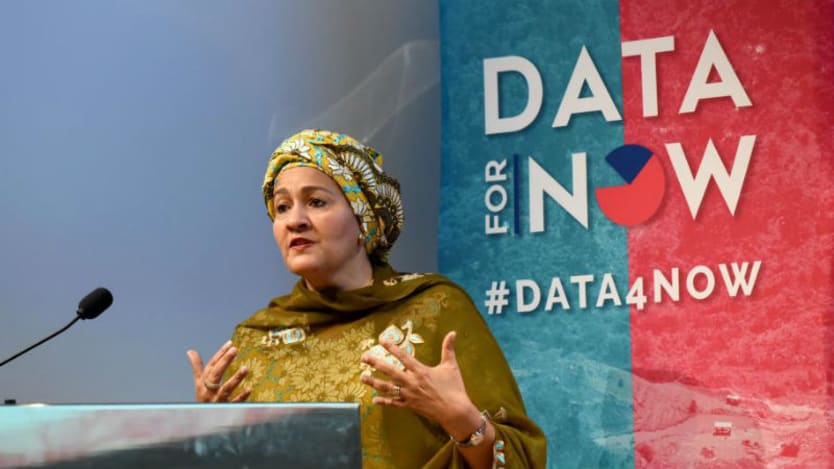New Google, UN partnership aims to 'turn on the tap' to SDG data

UNITED NATIONS — Data to track progress on the Sustainable Development Goals is outdated, and in many cases, incomplete.
Some of the biggest players in development and the private sector — including the United Nations and World Bank Group, as well as Google and Alibaba Group — launched a new partnership on Wednesday to jumpstart global data work and close the information gap impeding progress on the SDGs.

Activism. UHC. Climate. Read more of Devex's coverage from the 74th U.N. General Assembly.
The new initiative, Data For Now, will link Google Earth satellite imagery and mobile phone data with governments that need better understanding of some of the most complex development challenges, such as food insecurity or disease outbreaks.
“People have known for years that data is out of date, but they have had a sense they cannot do anything about it. With the increasing use of mobile phones and satellites and academic work that has gone into developing these tools, it means you can use these technologies in a rigorous way that can be useful,” Claire Melamed, CEO of the organizing network Global Partnership for Sustainable Development Data, told Devex.
“It becomes a problem that is eminently solvable if you have put together the right partnerships and the right investments,” Melamed continued.
Public data used to track progress on the SDGs often predates 2015, according to U.N. Deputy Secretary-General Amina Mohammed. Aside from being old, available data is also often inaccurate. About 1.1 billion people in the world cannot prove their identifies and are not counted in government statistics, Mohammed said during the launch of Data For Now at the Ford Foundation.
“These people are all but invisible in deciding policies … We need much more ambition, and in some cases we need a different approach. We know timely, disaggregated, and relevant data is central to achieving the SDGs,” Mohammed said. “Exclusion from data is one of the most fundamental challenges we face.”
4 years later, is it any easier to track the SDGs?
New data sources and a revamp of the U.N. High-level Political Forum could help monitor and assess progress on the SDGs. With lack of accurate data still hampering implementation, these changes can't come soon enough, development experts tell Devex.
The governments of Ghana, Rwanda, Senegal, Bangladesh, Nepal, Colombia, and Paraguay are the first to have signed on to the initiative. Government representatives and private sector partners will convene in mid-November to outline priorities for data collection and disaggregation. There has been additional interest from other countries, and the plan is to scale up “quickly,” Melamed explained to Devex in an interview.
“A lot of them feel that their leadership stands up every year and says, ‘This is how we are doing on the SDGs,’ and a lot of them just know in their hearts that they do not know. It’s not that they are lying. They just do not have the best information,” Melamed said.
Google announced a new agreement with the Global Partnership for Sustainable Development Data that will focus on distilling Google’s geospatial data into “timely, actionable insights,” according to Rebecca Moore, director of Google Earth. This will result in publicly accessible, real-time maps that could layer data on weather patterns and development activity, such as the disbursement of mosquito nets to determine where a malaria outbreak is likely to occur, Moore explained to Devex.
“You turn on the tap and the actual information comes out, whereas in the past you would make a map and it was valid for some period of time and then it was stale. You would not believe how many 5-year-old maps are being used all over the world to drive decisions, and the data is terrible. It is old and it is inaccurate,” Moore said.
Other initiatives under Data For Now include a joint World Food Programme and Alibaba digital hunger map to track food insecurity, and a partnership with Vodafone Ghana and the government of Ghana to use anonymized mobile phone data to inform development work.
Moore mentioned during the launch that deciding on how to target the data collection and analysis will be one key issue moving forward.
Multiple algorithms can be replicated and used to capture data on many issues at once, Moore explained after the launch event. But she suggested that it might still make sense to focus on a few, core SDG indicators at a time, rather than all 244 of them.
“If you say, we want to solve 240 things at once, we are not going to do a good job with any of it,” Moore explained. “There could be an advantage to focusing on the indicators that are most critical, where there are the biggest gaps right now, and where we think we could fill those gaps if we focus, and where it would really matter if we did.”
Activism. UHC. Climate. Read more of Devex's coverage from the 74th U.N. General Assembly.
Search for articles
Most Read
- 1
- 2
- 3
- 4
- 5




